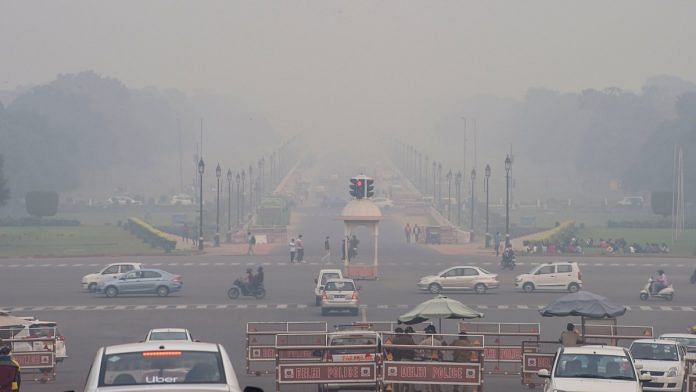New Delhi: Delhi Environment Minister Gopal Rai Thursday said farmers in the national capital will be provided a low-cost chemical that can decompose paddy crop, in a bid to prevent them from setting farm residue on fire, which is seen as a major source of winter pollution in the region.
Rai said the production of the low-cost chemical, called the Pusa decomposer, will start within a week, after which it will be provided free of cost to farmers.
The Pusa decomposer, being developed by Indian Agricultural Research Institute in Delhi, will also be used on a trial basis in some paddy fields of Punjab and Haryana this year, Union Minister Prakash Javadekar said.
The two ministers were speaking at separate press briefings Thursday in Delhi, after the Centre conducted a review meeting with representatives from Delhi, Haryana, UP, Punjab and Uttar Pradesh on the work done so far on tackling pollution.
Farmers in Punjab have already begun stubble burning, which appears to have affected air quality in New Delhi.
As of Thursday afternoon, the AQI for Delhi was about 155, putting it in the moderate category. The Delhi government’s pollution forecaster SAFAR, however, predicts that the AQI in the city is likely to worsen to the ‘poor’ category by 4 October.
Also read: India’s clean air days might be numbered as crop-burning season starts
‘Modi govt spent Rs 700 crore on happy seeders’
During his briefing, Javadekar said that over Rs 700 crore has been spent in providing subsidised ‘happy seeders’ to farmers.
These machines attached to the tractors help remove the crop residue from the fields, turn them into mulch and mix it in the soil when farmers sow their next harvest.
“Farmer cooperatives are given 80 per cent subsidy, while individual farmers can avail 50 per cent subsidy for buying these machines,” Javadekar said.
However, in another press briefing that followed, Rai explained that farmers still have to spend money out of their pockets for these expensive machines.
The Delhi government has thus appealed to the states to start using the new chemical.
“The Centre gives Delhi Rs 30 crore for subsidies on happy seeders. We have calculated that the total cost of producing and spraying the decomposer chemical instead is just Rs 20 lakh for Delhi,” Rai said.
He announced that a plant, which will produce this decomposer in bulk will be set up at Kharkhari Nahar village in Delhi by 5 October, and that it will start producing the first batch of the decomposer the very next day.
“It will take five or six days to produce the first batch of the decomposer,” Rai said. Farmers in Delhi can fill up a form to avail the spraying service of the decomposer for free.
Javadekar also said that the chemical looks promising and that the trials will be conducted in fields of Punjab and Haryana this year to evaluate its success.
Focus should be region-centric
Both ministers also said that the focus of pollution control measures should be more regional than city-centric.
Delhi and its surrounding regions all comprise a single ‘airshed’ — a part of the atmosphere that behaves similarly in how emissions get dispersed. Pollutants within this region need to be tackled simultaneously.
To that end, Javadekar said that all the officials concerned across states need to work in tandem, keeping politics aside.
Rai meanwhile pointed out that 11 power stations in areas surrounding Delhi, which still work on old technologies, contribute significantly to the pollution.
“The Supreme Court had given these power stations time until December 2019 to shift to new technologies, but that still has not happened,” Rai said.
Moreover, Rai pointed out that 1,640 brick kilns in Uttar Pradesh, 161 in Haryana, and 164 in Rajasthan had not switched to the new zig-zag technology, which improves the energy efficiency of brick making units.
Both ministers, meanwhile, appealed to citizens of Delhi to also take measures to reduce pollution. While Javadekar said that people should consider walking or cycling shorter distances, Rai appealed to citizens to not burst firecrackers this Diwali.
Also read: Covid spread & mortality seems to increase with air pollution, says study of Dutch provinces



